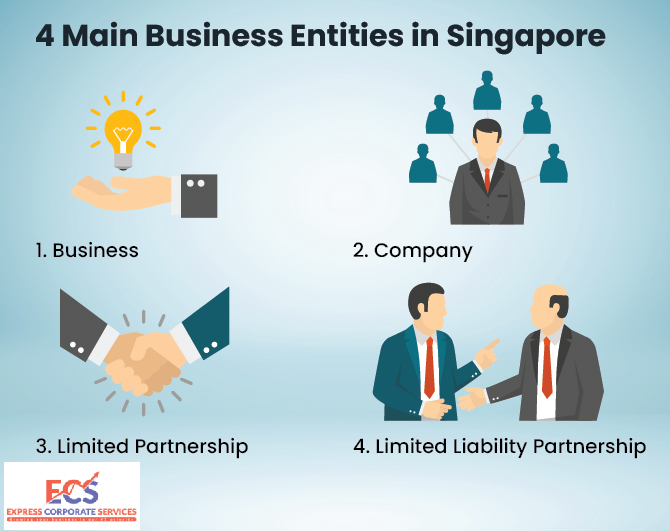
Before registering your business in Singapore, you have to decide what type of entity you want your business to be. There are four main types of business structures in Singapore: Business, Company, Limited Partnership (LP) and Limited Liability Partnership (LLP). These structures are different in terms of the number of owners, whether owners or partners are personally liable for debts or losses of the business, legal status, and more. As such, it is important to make a thorough assessment of your business goals and objectives before you choose the type of structure for the formation of your company.
We share the distinct characteristics of each to help you pick the most suitable structure for your Singapore business:

Business
A business can exist either as a sole proprietorship or partnership. A sole proprietorship can be controlled by a single person, a company, or a limited liability partnership (which we go on to explain in more detail later). Whereas, a partnership is a business that is owned by 2 to 20 partners, and these partners can be an individual, company or limited liability partnership (similar to a sole proprietorship).
Whether a sole proprietorship or partnership, business owners are not separate legal entities from the business, and so experience unlimited liability, or in other words, are personally liable for the debts and losses of the business. For partnerships, you should note that every owner is equally responsible for the liabilities of the business, which means even if you do not have any debts, you will be liable for the debts of other partners.
Generally, sole proprietorships are ideal for small businesses as they can be owned and run by a single person. Similarly, partnerships are suitable for small businesses, only to be run by multiple partners.
Company
Companies in Singapore are either public or private companies incorporated with ACRA (Accounting and Corporate Regulatory Authority). There are four types of company structures: Exempt Private Company, Private Limited Company, Public Company Limited by Shares, and Public Company Limited by Guarantee. Out of these, the ideal company structure in Singapore is the private limited company that has either Pte. Ltd. or Ltd. as part of its name, chosen by most entrepreneurs and investors.
A private limited company is owned by 1 to 50 shareholders, managed by a director or board of directors, and operated by its officers – and it exists as a separate legal entity from its shareholders and directors. This means that business owners are not personally liable for the debts and losses of the company. The advantage of owning a private limited company is that it is highly scalable; you can easily bring in new shareholders or issue more shares to current shareholders to raise capital. Incorporated private limited companies also enjoy wonderful tax benefits, qualifiable for tax exemption schemes as well as taxed at 0 – 17% corporate tax rate.
Altogether, Pte. Ltd. companies are the best company structure for entrepreneurs serious about expanding their business in the future.

Read more the company formation process in Singapore: ‘Guide to Company Incorporation in Singapore’
Limited partnership (LP)
In a limited partnership, there are at least two partners: a minimum of one general partner and one limited partner. The general partner is personally liable for debts and losses of the business, while a limited partner enjoys limited liability. A limited partnership is not legally separate from its partners, which means that the business entity cannot own property in its own name.
Put simply, a limited partnership enables you to opt for a degree of limited liability that a business does not have, as long as you are registered as a limited partner.
Limited liability partnership (LLP)
Limited liability partnerships are different from limited partnerships in that all partners in an LLP enjoy limited liability. Similar to a private limited company, a limited liability partnership is a separate legal entity from its partners, which means that it can own property in its own name, sue and be sued in its name, as well as do other lawful acts in its name.
There are many similarities between a LLP and private limited company, but whilst a LLP is easier to set up, partners are still liable to some degree, although it is limited. For instance, a partner may be personally liable for their own wrongful acts or omissions but not for those of other partners.
Overall, before the incorporation of your company in Singapore, ask yourself questions like whether you want to own the business alone or with other partners, how much capital you can afford to invest, whether you can finance your business solely or together with other people, and what are your business goals in the long run. An LLP may be suitable for a low risk business venture, but one that has greater risks might do better as a Private Limited Company, as it offers greater protection and opportunities to scale your company to greater heights.
Express Corporate Services offers professional incorporation services to help entrepreneurs register their business in Singapore efficiently and hassle-free. Get in touch with us to find out how we can help you incorporate your company!
